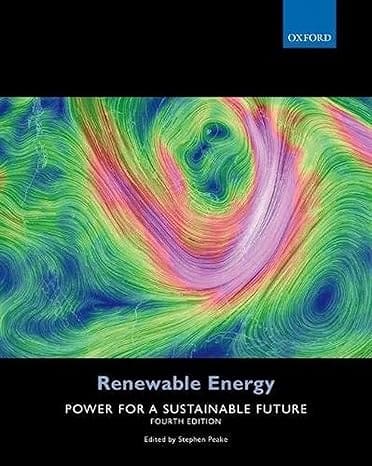
Renewable Energy: Power for a Sustainable Future
Before we dive into the extensive advantages of renewable energy over non-renewable energy, we highly recommend you check out the book Renewable Energy: Power for a Sustainable Future by Stephen Peake. This comprehensive guide provides valuable insights into the practical and economic potential of renewable energy sources, helping you understand how we can meet the challenges of an expanding and increasingly productive world using sustainable alternatives.
Now, let’s delve into the ‘Advantages of Renewable Energy over Non Renewable Energy’. As you navigate through this post, you’ll see how renewable energy is not just a feasible solution but a necessary one for our future…
Introduction
Energy rules our world. From powering our homes to fueling our cars, energy is a vital part of our day-to-day lives. But not all energy is created equal. Renewable energy sources, like the sun, wind, and water, have significant advantages over non-renewable energy sources, such as coal, oil, and gas. Let’s explore these benefits and the problems they solve.
Environment-friendly Energy
One of the key advantages of renewable energy over non-renewable energy is its minimal impact on the environment. Renewable energy sources emit less greenhouse gases compared to fossil fuels, dramatically reducing our carbon footprint. They’re not just energy-efficient; they’re also clean and green.
For instance, look at solar panels. They generate electricity without releasing harmful pollutants into the atmosphere. Similarly, wind turbines transform wind energy into power, without the need for combustion, making it a clean and green energy choice.
Renewable Energy and Sustainability
Renewable energy sources are virtually inexhaustible. They regenerate naturally, ensuring a sustainable supply. Unlike fossil fuels, we won’t run out of sun, wind, or water. This sustainability ensures a reliable energy supply for generations to come.
Additionally, renewable energy supports sustainable development. It promotes economic growth, reduces inequalities, and fosters peaceful communities. By embracing renewables, we can build a more sustainable future.
Economic Benefits of Renewable Energy
The renewable energy sector is a significant job creator. From manufacturing solar panels to constructing wind farms, renewable energy boosts employment opportunities. Moreover, investing in renewable energy spurs economic growth.
Countries like China and Germany have realized the economic benefits of renewable energy. They’ve invested heavily in renewables, creating jobs, driving innovation, and boosting their economies.
Energy Security and Independence
Renewable energy promotes energy security and independence. Unlike fossil fuels, which are unevenly distributed across the globe, renewable resources are widely available. Countries rich in renewable resources can achieve energy independence, reducing their reliance on imported fuels.
Take Denmark, for example. It’s a world leader in wind energy, meeting more than 40% of its electricity demand through wind power. This independence from fossil fuels enhances national security and economic stability.
Problems Solved by Renewable Energy
Addressing Non-renewable Resource Depletion
Our planet’s reserves of coal, oil, and gas are finite. As we continue to consume these resources at an alarming rate, the threat of depletion looms large. Renewable energy provides a viable solution, offering an inexhaustible supply of power.
Reducing Environmental Impact
Non-renewable energy sources contribute significantly to air and water pollution. Renewable energy, on the other hand, generates power with minimal environmental impact. From reducing smog to minimizing waste, renewables are a cleaner, greener choice.
Mitigating Climate Change
Non-renewable energy sources are the main contributors to global warming. By shifting to renewable energy, we can significantly cut greenhouse gas emissions and combat climate change. Every solar panel installed or wind turbine erected helps us fight the global climate crisis.
Q&A Section
What are the main advantages of renewable energy over non-renewable energy?
Renewable energy is eco-friendly, inexhaustible, and promotes energy independence. It also drives economic growth and job creation.
How does renewable energy contribute to economic growth?
Investment in renewable energy drives job creation, spurs innovation, and boosts economic activity.
How does the transition to renewable energy help in climate change mitigation?
Renewable energy produces less greenhouse gas emissions compared to non-renewable energy, helping to slow down global warming.
What are some examples of renewable energy sources?
Examples of renewable energy sources include solar, wind, hydro, and geothermal energy.
Renewable Energy Technologies: Harnessing the Power
Solar and Wind Power
Pioneering the field of renewable energy technology, solar and wind power are making significant strides. Solar panels have the ability to convert sunlight directly into electricity. In contrast, wind turbines capture and convert kinetic energy into usable power. Not only are these technologies efficient, but they are also scalable and becoming more affordable with each passing day.
Hydroelectric and Geothermal Energy
Hydroelectric power harnesses the energy of flowing or falling water. Geothermal energy, on the other hand, exploits heat from the earth’s interior. Both these technologies offer reliable, constant power, making them an excellent choice for meeting base load energy demand.
Conclusion: The Future of Renewable Energy
The advantages of renewable energy over non-renewable energy are clear. From environmental benefits to economic gains, renewable energy is the way forward. As we look to the future, the shift towards renewable energy isn’t just desirable—it’s essential. It’s time for us all to embrace the power of renewables. The future of our planet depends on it.
Other Article
Thank you for taking the time to explore the ‘Advantages of Renewable Energy over Non-Renewable Energy’ on Sunny Days Go! If you found this information valuable, we encourage you to share it with others who might also be interested.
In addition, we have a variety of other engaging and informative articles on our website that delve into related topics. You might enjoy:
- Understanding Energy: Its Importance in Everyday Life, which serves as a comprehensive guide to the role and significance of energy in our daily activities.
- Understanding Energy In The Human Body: And Why You Should Care, a detailed exploration of how our bodies create, store, and utilize energy and why this knowledge is crucial for our health and well-being.
- Natural Ingredients, a glossary entry that offers insight into the benefits and uses of natural ingredients in various products.
- Understanding Your Human Energy Body: A Comprehensive Introduction, an in-depth explanation of the energy body concept and how it impacts our physical and mental health.
- Sustainable, a glossary term that provides a concise and clear definition of sustainability and its importance in today’s world.
We hope these resources continue to enlighten you on your journey towards understanding energy and sustainability better.
